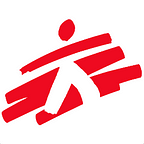Just a few weeks ago I was working in Yemen. Here’s what I witnessed
By Tatiana Chiarella
Nurse Tatiana Chiarella spent most of 2017 working in Doctors Without Borders/Médecins Sans Frontières (MSF) trauma facilities in Iraq and Yemen.
For the past week, I’ve been in California working as a guide with our Doctors Without Borders traveling exhibition on the global refugee crisis.
All day I speak to school groups and members of the general public, about the various reasons millions of people around the world are on the move in search of safety.
I tell them that just a few weeks ago I was working in Yemen — a war zone, where the health system has collapsed and where people are trapped and at high risk of dying from violence of war, or the indirect consequences of war such as malnutrition, epidemics, or simply the inability to access healthcare facilities.
The war is not over and the violence continues. It feels endless. But someone has to do something, and even if I don’t know when it is going to end, I have to keep hope that one day it will end — otherwise I could not do this job.
In Yemen, electricity is sporadic, water is hard to find, the sewage system is a mess, and tens of thousands of public sector health workers across the country haven’t been paid for more than a year. I asked why they continue to work with no salary. They see no other options, if they leave then who will do it? This is their home, their families, their community, so even if they don’t receive a salary they know that somebody has to do it. So, they sell their belongings and start business on the side, just to get by.
Public hospitals have run out of resources, so even though care is meant to be free, patients are asked to go to the market and buy their own medicines. MSF provides free care, but we can’t treat everyone.
It’s really difficult to turn a patient away because we don’t offer the type of care they need. I have no neurosurgeon, for example, so I refer the patient to a hospital that should have a neurosurgeon. But often what happens when they go to that hospital for the surgery is that the hospital doesn’t have the materials they need for the surgery, or the patient needs certain medications, but the hospital has no medication. I never know if they will actually get the care they need.
We have a saying in Brazil, secar gelo, for when something feels useless. In English, it translates to dry ice. Trying to dry ice is pointless; you dry it, but it continues to melt, no matter how hard you try.
Despite these obstacles, MSF and national staff in Yemen continue the work. This past year, MSF responded to one of the largest cholera epidemics in history — a direct consequence of the war, and a sign of a system that has collapsed and a population greatly in need.
Unexploded landmines and grenades scatter the streets where children play; we treated many for missing limbs.
At the hospital where I worked, in Aden, we received a family of five who suffered severe injuries from a grenade explosion. The mother and aunty had treatable shrapnel wounds but the father and uncle did not survive. Both had severe wounds requiring emergency surgery; the father died before reaching our facility and the uncle passed away two days later in the intensive care unit.
The fifth family member was a three-month-old baby girl. Both of her feet had been crushed during the explosion. When the mother saw the grenade, she jumped to protect her baby, unwittingly crushing her feet. Although our surgeons saved the baby’s feet, the mother blamed herself and her guilt was crippling.
While the baby was receiving care, we referred the mother to multiple sessions with one of our counselors. Mental health care is such an important component to the care we provide anywhere in the world; sometimes it can be more lifesaving than physical care. The mother’s mental health improved quickly, and after a few follow up consultations, she was smiling again.
Large metal plates across every window block even a sliver of natural light from entering the MSF trauma hospital in Aden. These serve as a reminder of the days when the facility was near the frontline and it was too dangerous for staff to go home. One of my Yemeni colleagues lived in the hospital for nine months, not meeting his newborn daughter until she was three months old.
We have a saying in Brazil, secar gelo, for when something feels useless. In English, it translates to dry ice. Trying to dry ice is pointless; you dry it, but it continues to melt, no matter how hard you try. I sometimes think of this saying when I am treating patients in conflict settings like Yemen. I treat patient after patient after patient but the wounded keep coming and coming and coming.
The war is not over and the violence continues. It feels endless. But someone has to do something, and even if I don’t know when it is going to end, I have to keep hope that one day it will end — otherwise I could not do this job.
This week in California I tell these stories to people who might never know about Yemen or some of the other conflicts where I’ve worked. It’s a way to educate people and help them see what I’ve seen. It’s also a way to continue my work, even when I’m far from our patients and staff.
